Introduction
In the competitive landscape of startups, the strategic selection and implementation of essential IT tools can be the linchpin for success. With a staggering 63% failure rate among information startups, the right resources become not just advantageous but critical for survival and growth.
This comprehensive overview delves into the key IT tools that can empower startups, including:
- Project management software
- Customer relationship management systems
It also addresses the importance of:
- Strategic planning
- Risk mitigation
- Ongoing support
By embracing innovative technologies and agile methodologies, startups can cultivate a resilient operational framework that not only enhances productivity but also positions them favorably in an ever-evolving market.
As the digital landscape continues to transform, understanding and leveraging these tools will be paramount for startups aiming to thrive amidst uncertainty.
Essential IT Tools for Startups: A Comprehensive Overview
For new businesses, the careful selection of IT solutions for startups is paramount to establishing a robust operational foundation. With a staggering 63% failure rate among information businesses, investing in the right resources can significantly influence long-term success. As highlighted by Tracxn, some of the largest investors in the sector include Y Combinator, Plug and Play Tech Center, TechStars, Shadow Ventures, and Brick & Mortar Venture, underscoring the competitive environment in which new businesses operate.
Key tools that every new venture should consider include:
- Project Management Software: Platforms such as Trello and Asana are invaluable for task management and team collaboration, especially for remote teams, ensuring that projects stay on track and deadlines are met.
- Communication Platforms: Applications like Slack and Microsoft Teams enhance team communication, facilitating collaboration and quick decision-making across dispersed workforces.
- Customer Relationship Management (CRM): Tools like HubSpot and Salesforce play a critical role in managing customer interactions, which can lead to improved service delivery and customer satisfaction.
- Cloud Storage Solutions: Services such as Google Drive and Dropbox provide secure data storage and seamless access for all team members, making information sharing efficient and reliable.
- Accounting Software: Financial management tools like QuickBooks and Xero streamline accounting processes, allowing new ventures to focus on their core activities while ensuring accurate financial reporting.
Additionally, it is important to consider that the global quantum computing market is projected to grow from $470 million in 2021 to $1.765 billion by 2026, indicating emerging technologies that could impact future IT tool selection. Key factors for small enterprise IT budgets include IT infrastructure upgrades (57%) and heightened security concerns (38%), which further influence the necessity of investing in the right tools.
By strategically investing in IT solutions for startups, new ventures can cultivate an environment that enhances productivity and fosters growth, ultimately driving better operational outcomes and increasing their chances of success in a competitive landscape.
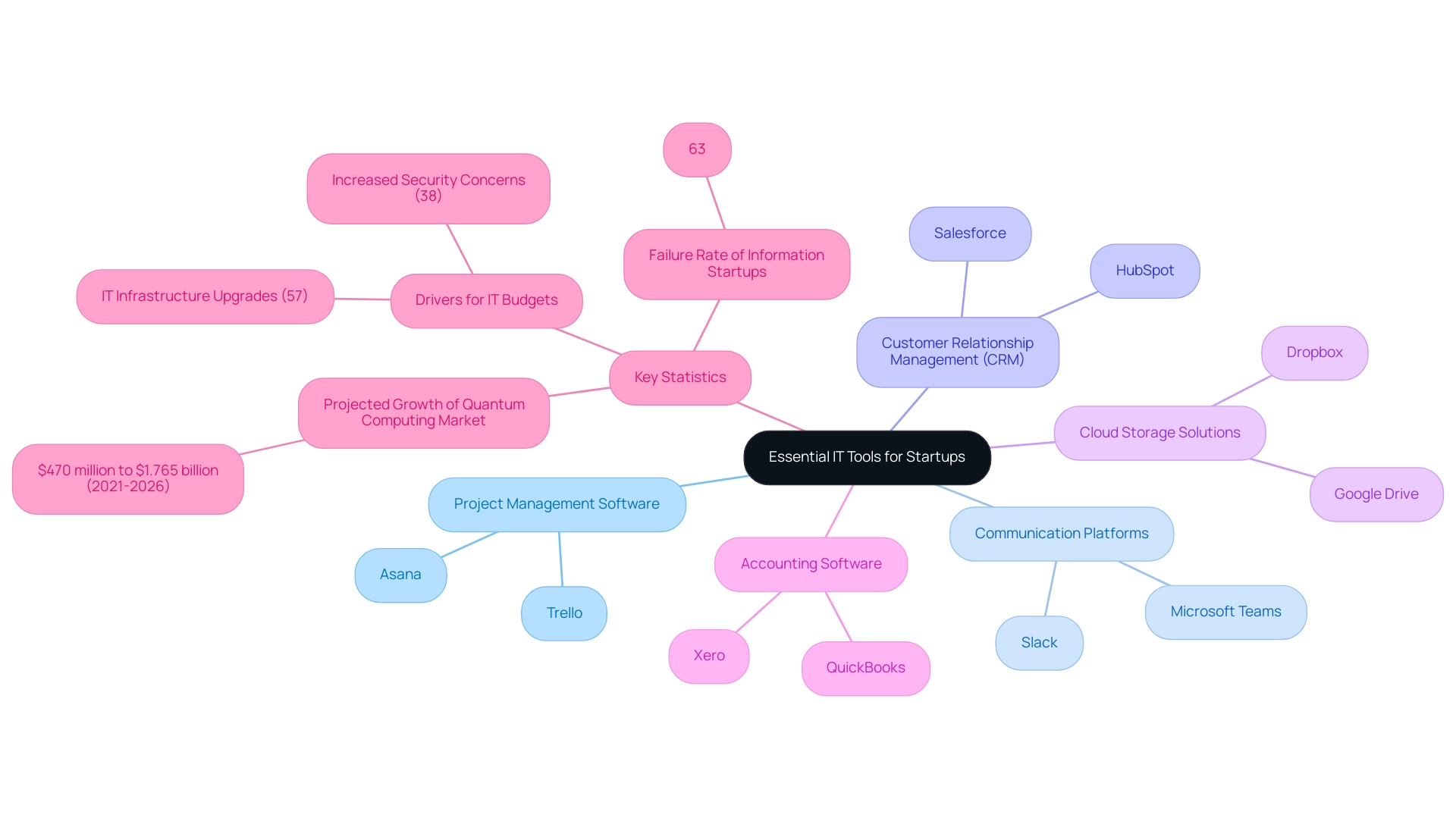
Strategic Planning and Risk Mitigation in IT Implementation
For new businesses to effectively implement IT solutions for startups, it is paramount to have a structured approach to strategic planning and risk mitigation. The following key steps should be prioritized:
-
Define Clear Objectives: Establishing specific and measurable goals is essential to guide IT initiatives. This clarity aids in aligning technology efforts with overall corporate strategy.
-
Conduct a Risk Assessment: Identifying potential risks associated with technology adoption—such as data security vulnerabilities and compliance challenges—enables new ventures to proactively address threats before they escalate.
-
Develop Contingency Plans: Preparing for unforeseen obstacles by creating well-defined backup plans and appropriately allocating resources ensures that new ventures can respond swiftly to setbacks without derailing their progress.
-
Engage Stakeholders Early: Involving key team members in the planning process fosters buy-in and allows for early identification of concerns, enhancing the overall effectiveness of the strategic plan.
According to the McKinsey Panorama Report, the largest challenge facing FinTech new ventures is the cost of customer acquisition, which can be mitigated through effective planning. Moreover, the statistic that approximately 90% of startups fail, often due to misreading market demand or running out of funding, underscores the critical nature of these strategic steps. Adding to this, it's important to note that 25% of enterprises without a strategic plan fail within just two years.
This statistic emphasizes the necessity of a well-thought-out approach to avoid premature failure. Furthermore, recognizing personal downfalls and learning from other businesses' failures can provide invaluable insights for founders, guiding them in making informed decisions. By embracing these strategies, new ventures can better navigate the complexities of IT implementation and utilize IT solutions for startups, significantly reducing the likelihood of setbacks and fostering a more resilient organizational framework.
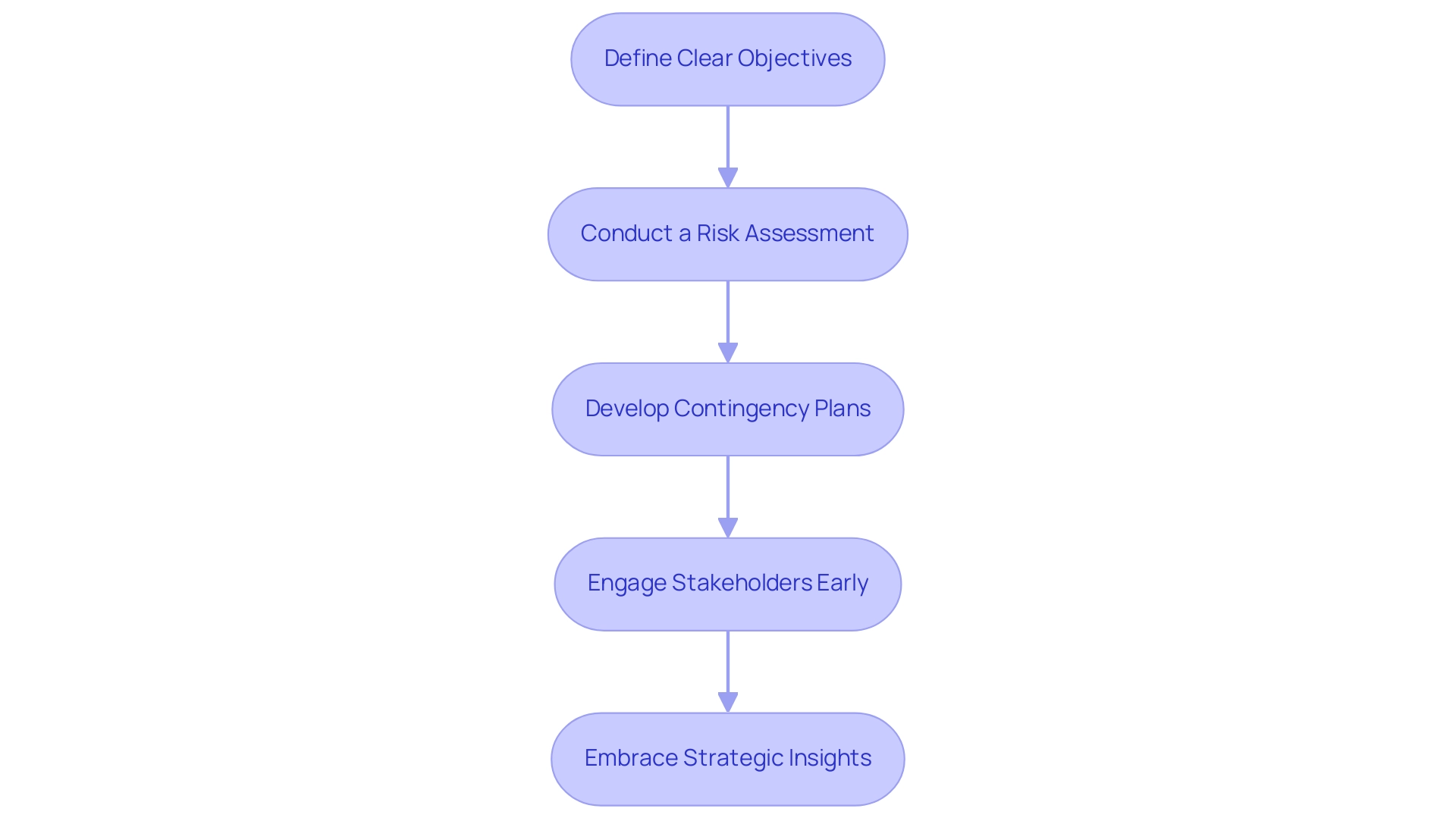
Embracing Agile Development for Startup Success
Agile development offers IT solutions for startups by providing a robust framework to swiftly adapt to evolving market demands and enhance innovation. Fundamental practices within agile methodologies include:
- Scrum Meetings: These regular check-ins are pivotal for fostering communication among team members, enabling prompt identification and resolution of challenges. A growing body of evidence supports their effectiveness, with 78% of U.S. government executives affirming the positive impact of agile methodologies on organizational performance.
- Iterative Development: By breaking projects into smaller, manageable components, groups can facilitate continuous feedback and iterative improvements, which are essential for maintaining momentum and ensuring alignment with market needs.
- User-Centric Design: Prioritizing user feedback ensures that products not only meet customer needs but also resonate with their preferences, ultimately enhancing satisfaction and loyalty.
- Flexibility in Planning: Agile frameworks empower teams to adjust project plans dynamically based on shifting requirements or new insights, thus maintaining relevance in a fast-paced environment.
Despite the benefits of agile methodologies, it's noteworthy that only 3% of organizations currently utilize Nexus, indicating a potential area for growth in agile adoption. Embracing these agile practices allows new ventures to significantly improve their responsiveness and drive innovation, leading to enhanced success in the marketplace. Additionally, a case study titled "Employee Acceptance of Retrospectives" highlights that retrospectives are highly valued by employees, with an average ROTI score of 8.33, underscoring their importance in Agile processes.
As evidenced by recent trends, with 80% of U.S. federal IT projects adopting agile or iterative methods by 2017—up from just 10% in 2011—these IT solutions for startups enable them to position themselves effectively against their competitors. Moreover, 65% of HR leaders think the Covid-19 pandemic positively affected the transition towards agile HR, reinforcing the importance of agile methodologies in today's professional environment.
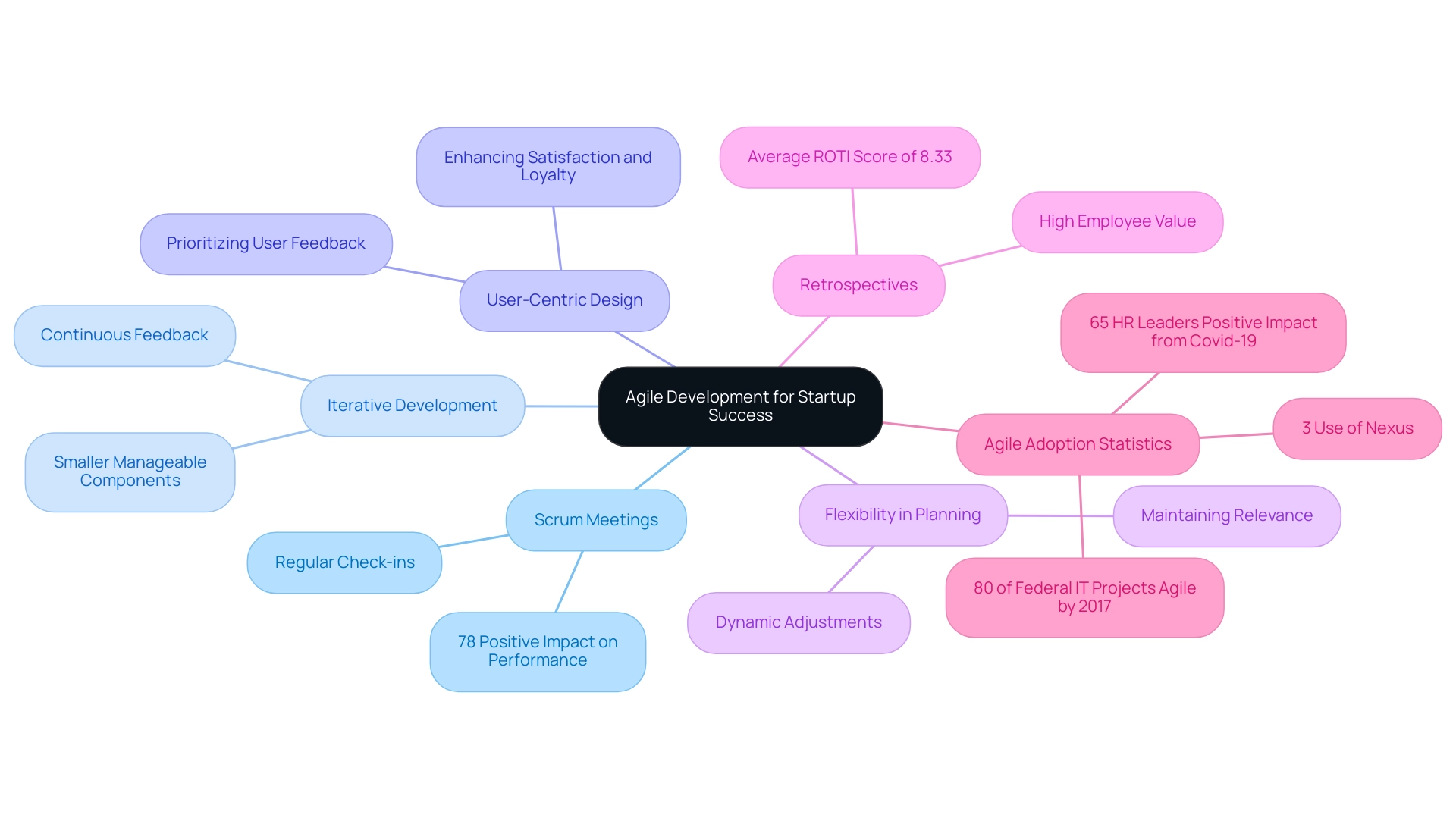
The Role of Ongoing Support and Optimization in IT Solutions
To maximize the effectiveness of IT solutions for startups, new ventures must prioritize ongoing support and optimization strategies. Key practices include:
- Regular System Audits: Conducting periodic evaluations of IT systems is essential for identifying areas that require improvement and mitigating potential issues. Recent trends indicate that regular audits can significantly enhance overall system performance and security.
- User Training Programs: Implementing training initiatives for employees ensures they effectively utilize IT tools, ultimately enhancing productivity. This is crucial, given that inadequate user training can lead to operational inefficiencies and increased costs.
- Feedback Loops: Establishing mechanisms for users to provide feedback on IT solutions enables continuous improvement and adaptation to user needs. This approach fosters a culture of collaboration and responsiveness within the organization.
- Performance Metrics: Regularly monitoring key performance indicators (KPIs) allows for an accurate evaluation of IT solutions' success and impact. This data-oriented method assists new ventures in making knowledgeable choices about their IT expenditures.
These strategies not only enable emerging companies to adjust to changing market conditions but also ensure that their IT solutions for startups remain strong and efficient. In a landscape where at least 10% of IT spending fails to align with organizational goals, these strategies are indispensable for achieving sustainable growth. Furthermore, video content marketing can increase organic search traffic by 157%, highlighting the importance of effective IT solutions in enhancing marketing efforts.
As LinkedIn states, 'Video content marketing can increase organic search traffic by 157%,' emphasizing the broader implications of IT effectiveness. Additionally, the financial costs associated with cyber incidents, estimated to reach $6 trillion by 2021, underscore the necessity of improved security measures and ongoing support from IT service providers.
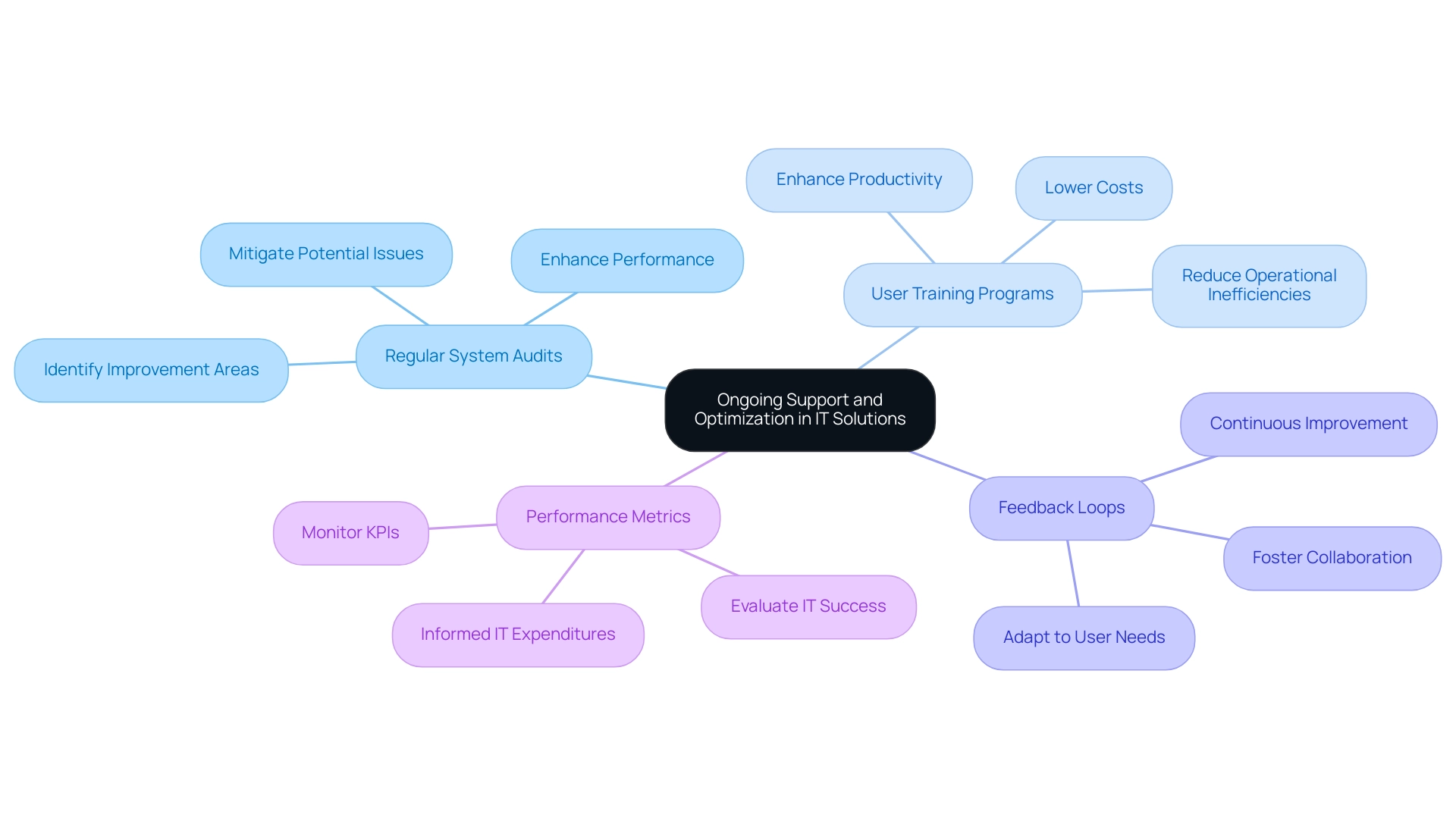
Leveraging Innovative Technologies for Enhanced Startup Operations
Startups can significantly enhance their operational efficiency and drive growth by leveraging a variety of innovative solutions, including:
-
Artificial Intelligence (AI): By integrating AI tools, startups can optimize data analysis, elevate customer service, and implement personalized marketing strategies. The demand for talent skilled in AI engineering and machine learning operations (MLOps) is rapidly increasing, with a pressing need for professionals in these areas as organizations embrace artificial intelligence. For instance, as of 2023, 75% of leading real estate brokerages in America are using AI, with 82% of real estate agents utilizing AI daily for crafting property descriptions. This illustrates the critical role of AI in industry-specific applications and the growing market, valued at $165 billion, including IT solutions for startups that enhance scalability, flexibility, and cost-effectiveness in operations. Recent statistics show that cloud computing is becoming crucial for small enterprises, as it provides IT solutions for startups without the burden of significant infrastructure investments. Small enterprises that adopt cloud computing can decrease IT expenses by around 30%, which allows them to allocate resources more effectively by utilizing IT solutions for startups.
-
Internet of Things (IoT): Utilizing IoT devices allows new ventures to optimize processes and obtain real-time insights into their operations. This capability not only enhances operational efficiency but also supports data-driven decision-making.
-
Blockchain Innovation: Exploring blockchain innovation can lead to secure transactions and improved transparency in supply chains, which is particularly vital for new enterprises aiming to establish trust and reliability in their business dealings.
By embracing these advanced innovations, new enterprises can not only streamline their operations and reduce costs but also unlock new business opportunities. The generative AI market within customer relationship management (CRM) is on track to surge from $19 million in 2022 to $119.9 million by 2032, reflecting a compound annual growth rate (CAGR) of 20.8%. This trend highlights the necessity for new businesses to integrate innovative technologies to remain competitive.
As highlighted by MarketWatch, AI-powered self-driving vehicles alone generate over $170 billion in annual revenue globally, signaling the vast potential for startups to harness similar technological advancements for substantial growth and success.
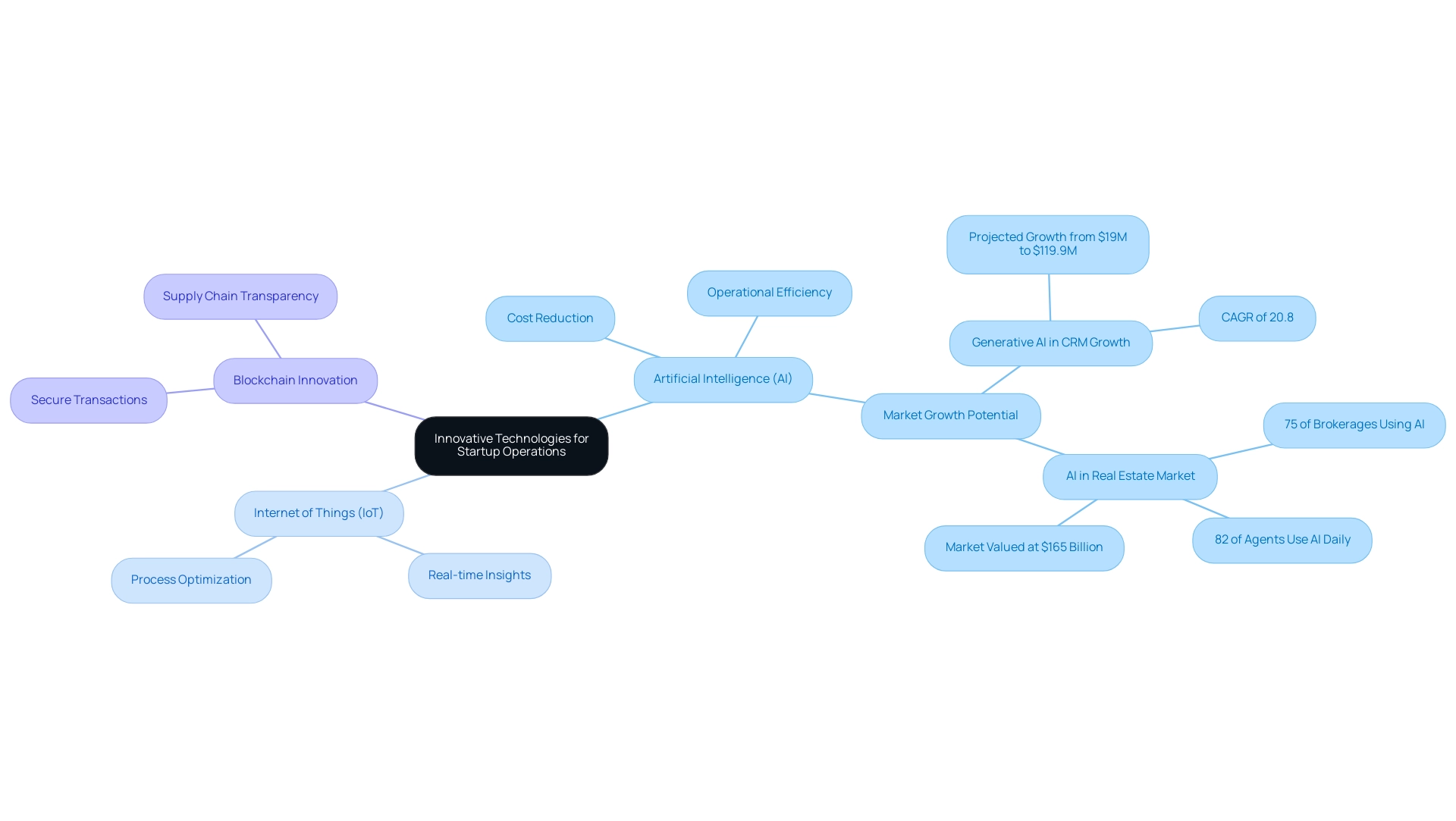
Conclusion
Strategic selection and implementation of essential IT tools are critical for startups navigating a competitive landscape. The article underscores the importance of utilizing:
- Project management software
- Communication platforms
- CRM systems
- Cloud storage
- Accounting tools
to create a robust operational framework. Each tool plays a vital role in enhancing productivity, collaboration, and financial management, which are essential for achieving long-term success.
In addition to selecting the right tools, the significance of strategic planning and risk mitigation cannot be overstated. Startups must:
- Define clear objectives
- Conduct thorough risk assessments
- Develop contingency plans
to navigate potential challenges. Engaging stakeholders early in the process fosters a collaborative environment that can lead to more effective outcomes.
Furthermore, embracing agile methodologies can propel startups toward innovation and responsiveness in a fast-paced market. By implementing practices such as:
- Iterative development
- User-centric design
startups can adapt quickly to changing demands, ensuring that their offerings remain relevant and competitive.
Finally, ongoing support and optimization of IT solutions are paramount for sustainable growth. Regular system audits, user training, and performance metrics enable startups to refine their operations continually. By leveraging innovative technologies like AI, cloud computing, IoT, and blockchain, startups can enhance their efficiency and unlock new opportunities.
In conclusion, the integration of these strategies and tools not only strengthens the operational foundation of startups but also significantly increases their chances of thriving in an unpredictable business environment. By prioritizing effective IT implementation and continuous improvement, startups can position themselves for success and navigate the complexities of the modern marketplace with confidence.




